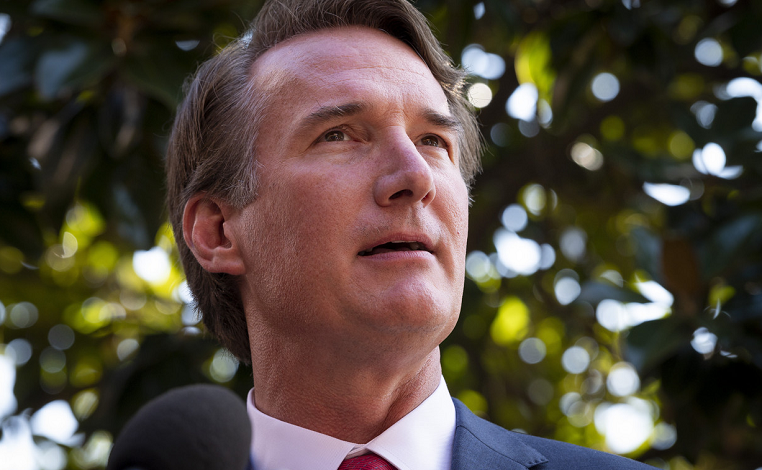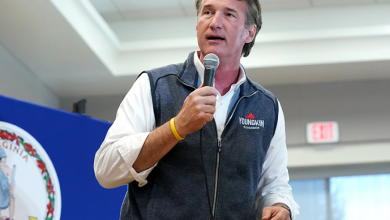Gov. Glenn Youngkin decided to end Virginia’s participation in the regional climate compact, now he is under fire from almost everyone

Roanoke, Virginia – Almost a year ago, WRIC first reported that Virginia Gov. Glenn Youngkin was thinking about pulling Virginia out of an agreement to combat climate change, despite backlash from environmental advocates. Since then, Va. governor was under constant fire from everyone living in Virginia including ordinary residents who think that state’s participation in the program was important for the state as a whole, but also for Virginias living in different areas across the state.
Governor Glenn Youngkin’s efforts to sever the commonwealth’s ties with a regional climate compact have stirred up a fiery storm of dissent. This contentious proposal is now open to public commentary, and the response has been overwhelmingly negative, with an outpouring of voices from Virginia’s concerned residents.
Ever since the digital town hall portal went live on January 30th, a deluge of feedback has flooded in. Over a thousand Virginians have seized the opportunity to share their thoughts and opinions on Youngkin’s proposal, which would effectively dismantle the carbon cap-and-trade provisions of the Regional Greenhouse Gas Initiative (RGGI). This crucial framework aims to reduce the carbon footprint of power plants and foster a cleaner, more sustainable energy landscape.
Despite the controversy, Governor Youngkin remains resolute in his stance. However, the overwhelming opposition to his proposal underscores the urgent need for a collaborative and forward-thinking approach to combatting climate change. With so much at stake, the people of Virginia have made their voices heard, calling for bold and decisive action to preserve the planet for generations to come.
So what people are thinking about Youngkin’s decision?
Out of the 500 most recent comments, a meager 10 were in favor of the governor’s proposal. The overwhelming majority of feedback harshly criticized the plan, with many urging the governor to reconsider and others resorting to scornful remarks targeted at him and his team.
Dr. Damian Pitt, a prominent researcher studying carbon reduction measures at VCU, highlighted the program’s allocation of profits from the sale of carbon credits. Specifically, he underscored the importance of utilizing these funds to support vital initiatives such as flood prevention and energy assistance programs for low-income households.
“This average of $125 million per year is more than double the amount of money otherwise available from federal, state, and utility programs that invest in low-income energy efficiency in Virginia,” he wrote.
“Stop being a tool, Youngkin,” wrote another commenter identified as Mike H.
Of the few residents who did write in support of Youngkin’s proposal, many emphasized the perceived unreliability of renewable energy sources.
“The road to hell is paved with good intentions. RGGI will create an unreliable power grid since reliable thermal energy generation will be replaced with unreliable wind and solar energy,” wrote Geoffrey Pohanka.
“Richmond has received $1,246,047 in RGGI Community Flood Preparedness Fund (CFPF) funding that is increasing flood protection and improving public safety in some of the most vulnerable and underserved neighborhoods in our community,” wrote Richmond Mayor Levar Stoney, who also opposed governor’s decision publicly.
Virginia’s participation in the RGGI and the carbon cap-and-trade market is mandatory under a law passed in 2019. This law authorizes the Director to establish, implement, and oversee an auction program that sells allowances in a market-based trading system that aligns with the RGGI program. However, the Department may not proceed if it determines that such an action would negatively impact the value of allowances and result in a net loss of consumer benefits.
Governor Youngkin has cited concerns over the “net loss of consumer benefit” in his push to abolish carbon credit auctions. In his executive order, he maintains that Virginia’s participation in the RGGI poses a significant risk of escalating electricity costs for its citizens. As such, he has prioritized a reassessment of the state’s involvement in this initiative, in the interest of preserving affordability and accessibility for all.
Under the RGGI, utilities such as Dominion are required to purchase carbon credits for every ton of CO2 and other pollutants emitted into the atmosphere. These credits can be used to cover their own emissions or sold to other companies, and the total number of credits decreases each year to incentivize companies to reduce their emissions.
However, Virginia’s new governor, Glenn Youngkin, has argued that the RGGI is a “regressive tax” that contributes to increased electricity costs for Virginia’s citizens. Youngkin attempted to withdraw Virginia from the RGGI through the legislature, but was blocked by Democrats in the state senate. Now, his administration is pursuing a regulatory appeal to withdraw Virginia from the RGGI regardless of public comments, citing a lower energy bill for Virginians in the future.
The state’s economic analysis of the program does not mention “a negative impact on the value of allowances” as a reason for discontinuing the cap-and-trade auctions, which is another statutory requirement for leaving the RGGI. Youngkin has also received significant campaign donations from fossil fuel producers, including $680,000 from the Gilliam family, who made their fortune in coal extraction in western Virginia.
The RGGI incentivizes renewable energy production, which could offset fuel costs for natural gas, coal, and petroleum power plants. Dominion recently gained approval for a $2.39 monthly increase to the average resident’s power bill to adjust for the cost of carbon credits, and a $14.93 monthly increase to cover fuel costs for power plants.
Overall, the governor’s push to withdraw Virginia from the RGGI has faced criticism from many Virginia residents, with just 10 out of the 500 most recent comments supporting the proposal.




